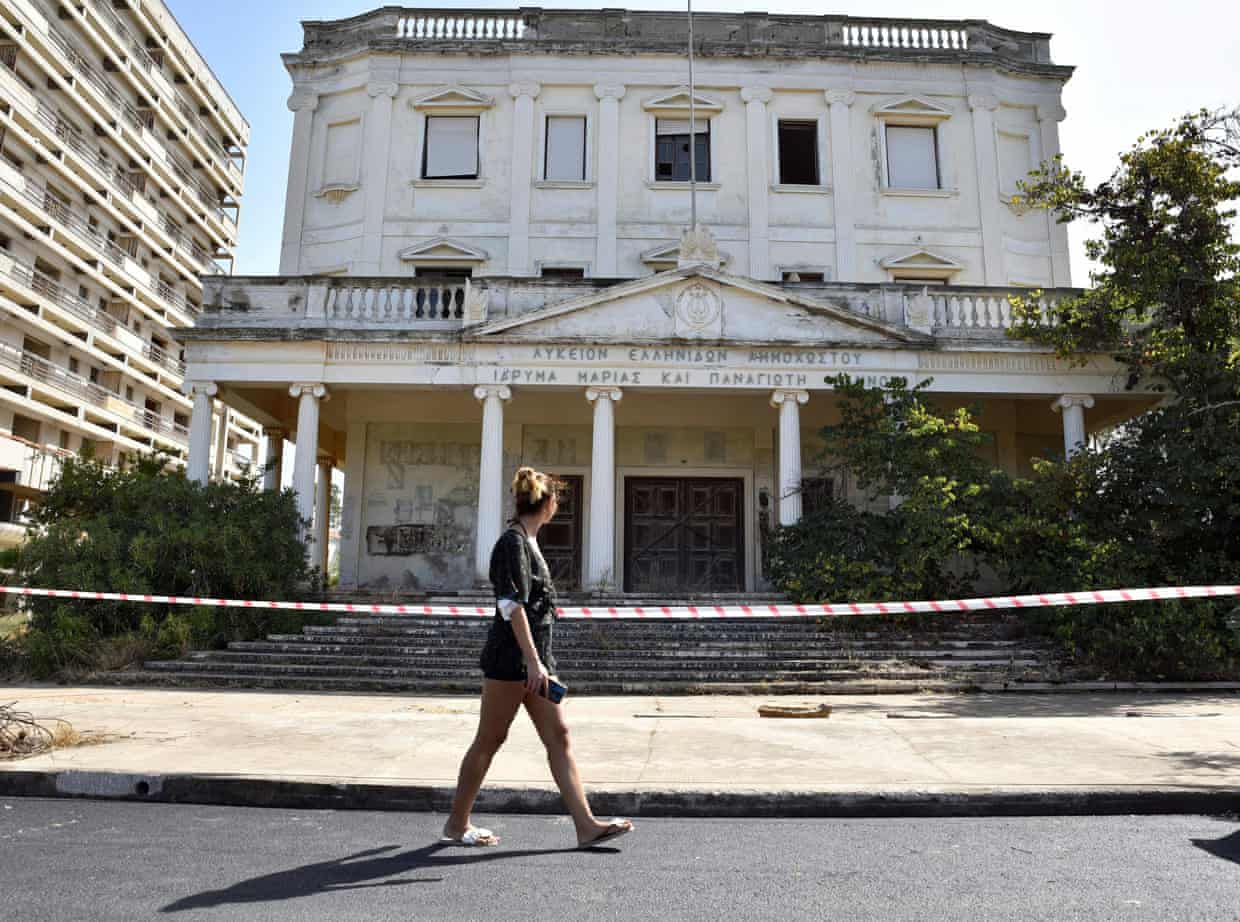Reopening of Cypriot ghost town adds to Greece-Turkey tensions
https://arab.news/wvcwj

The Cyprus dispute, together with tensions over the energy exploration activities of regional actors in the eastern Mediterranean, has several domestic and international dimensions. One of the internal issues concerns Varosha (Maras in Turkish), which is an abandoned district of the ancient city of Famagusta and one of the most iconic symbols of the division of the island. What is the importance of Varosha and why are we talking about it today?
Cyprus has been divided since 1974, when Turkey sent troops to the island in the aftermath of a Greek-inspired coup. The Cypriot administration in the south is internationally recognized, while only Turkey recognizes the Turkish administration in the north. Subsequent talks between the two sides and all efforts to reunite the island have so far failed to produce any breakthrough in terms of resolving the key disputes.
Varosha has resembled a ghost town since 1974. It remains under UN surveillance as a no man’s land between the north and the south. The city, which once attracted tourists from around the world, is protected by a 1984 UN Security Council (UNSC) resolution that says the town can only be resettled by its former inhabitants. It has remained out of bounds to the public ever since. The land is on the northern side, but the buildings on it belong mostly to people in the south.
A few days ahead of the first round of the northern administration’s presidential election, the issue of reopening Varosha came to the fore. During a joint press conference in Ankara with Turkish President Recep Tayyip Erdogan, northern Cypriot Prime Minister Ersin Tatar last week announced the decision to reopen parts of the town’s beachfront and the main street, Democracy Road, to the public. In an interview with the Turkish press, Tatar said that he is not aiming to confiscate any buildings, stressed that a commission has been organized to work on the identification of properties, and stated there will be options for the owners.
“The Varosha issue is a national cause above all political debates,” Tatar said. Erdogan supported his statement by saying: “We hope that Maras will be fully opened for use. We are ready to provide every support to the (Turkish Cypriot) authorities in this regard.” Erdogan also rebuffed the international criticism of the decision.
Greek Prime Minister Kyriakos Mitsotakis said the move was a clear violation of the UNSC resolution, while Cypriots said they would file for recourse with the global body. EU foreign policy chief Josep Borrell and UN Secretary-General Antonio Guterres also expressed concern that the decision may complicate efforts to resume the Cyprus settlement talks and could heighten tensions.
International leaders said the decision may complicate efforts to resume the Cyprus settlement talks.
Sinem Cengiz
The partial reopening of Varosha took place last Thursday, three days before the first round of the presidential elections. As a result of that vote, Tatar and his rival, incumbent Mustafa Akinci, will face off in the second round on Sunday.
Akinci supports the eventual reunification of Cyprus, with the island continuing as an EU member, while Tatar, backed by Ankara, favors closer ties with Turkey. Tatar won 32.35 percent of the votes in the first round, with Akinci on 29.84 percent, according to the Associated Press. The second round is crucial as northern Cypriot voters will decide whether they want to see another attempt to reunite the island or if they believe separation is a better course.
Not all Turkish Cypriot politicians were happy with the decision to reopen Varosha. Foreign Minister Kudret Ozersay criticized the announcement, saying: “Closed Varosha was perceived as if it was opened under the Turkish Cypriot administration and a move was made for the election.” He accused Tatar of making an “election investment.” Akinci said the decision was a “mistake that will put the Turkish Cypriot people in a difficult situation on the international stage.”
So Sunday’s voting will take place amid widespread concerns over the reopening of Varosha and the growing dispute between Turkey and Greece in the eastern Mediterranean. The Turkish research vessel Oruc Reis, which was last month pulled back to open the door for diplomacy, has been redeployed to disputed waters. Ankara said it made the move following provocative acts by Athens, including a decision to hold military drills in the Aegean Sea on Turkey’s main national holiday.
Needless to say, tensions in the eastern Mediterranean have been high for months and the diplomatic dispute over Varosha may put a further strain on relations between Greece and Turkey. The fallout over the reopening and a lack of trust can only be overcome through dialogue and cooperation between the two sides. They must start understanding each other’s concerns. In 2007, I had a chance to see the abandoned city from the beach — the place I saw should not be a source of yet another dispute, but rather a chance to rebuild trust on the island.
- Sinem Cengiz is a Turkish political analyst who specializes in Turkey's relations with the Middle East. Twitter: @SinemCngz









































